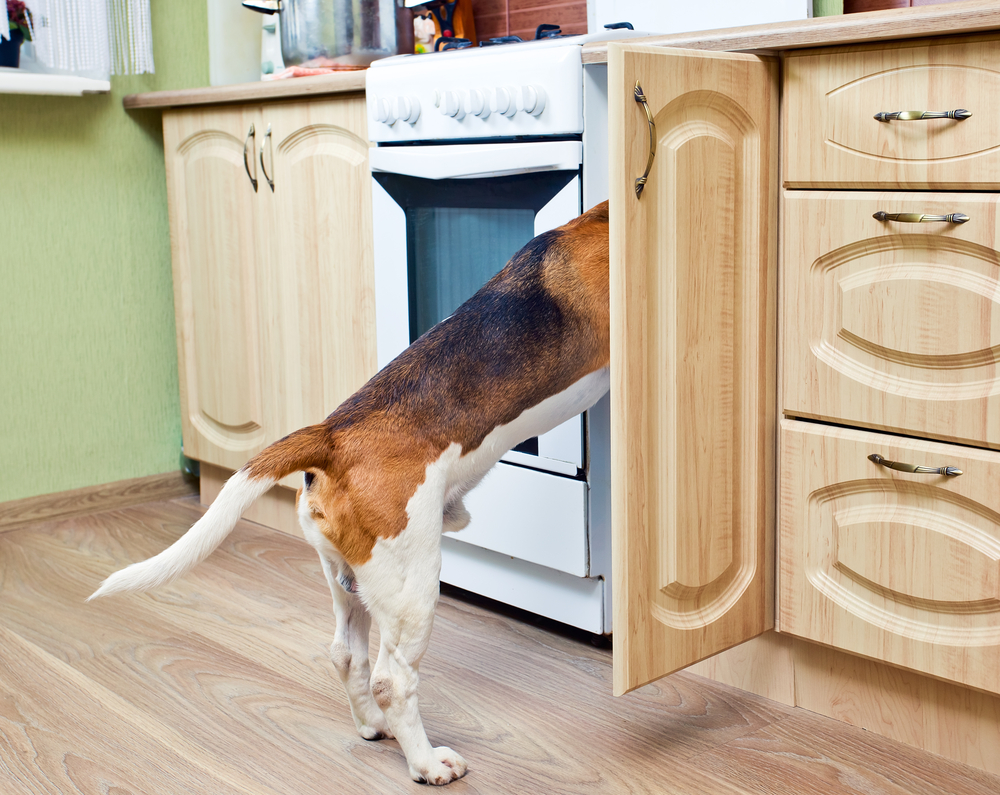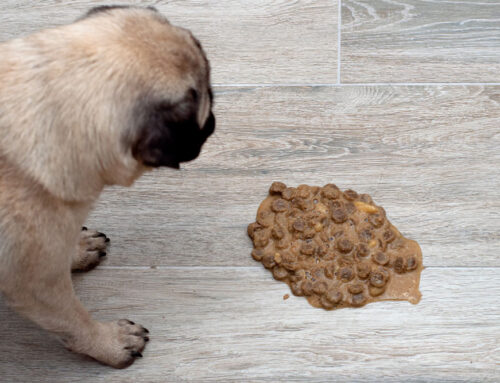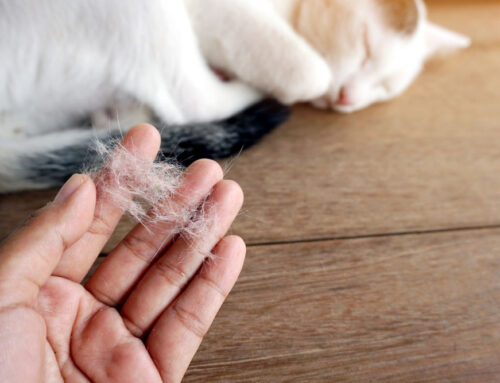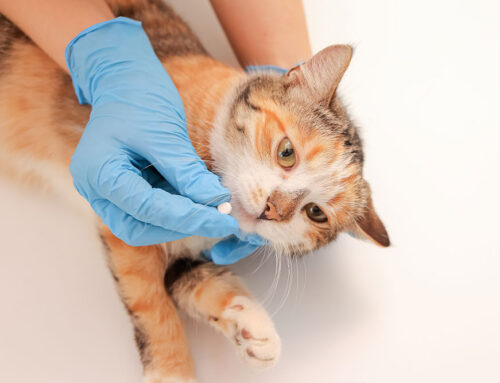Home is generally where we feel safest—and so do our pets. But, many everyday items can pose harmful—potentially deadly—threats to dogs and cats. Every year, national pet poison control services, including the ASPCA Animal Poison Control Center and the Pet Poison Helpline, receive countless calls about accidental ingestion and exposure to household toxins. Thanks to their fast-thinking owners, many of these pets make a full recovery—but others aren’t so fortunate.
Learn how to identify the everyday dangers in your home, garage, and yard with WesVet Animal Hospital’s guide to common toxins.
Pet toxic foods
Most pet owners know that chocolate is bad for dogs—but many other common foods and sneaky ingredients are dangerous, as well. The most common pet food hazards include:
- Chocolate — Especially bitter and dark chocolate
- Xylitol — Also known as birch sugar, this natural sweetener is used in sugar-free gum, candy, mints, and baked goods. Many snack foods, including peanut butter and pudding, also contain xylitol.
- Caffeine — Common pet-tempting sources include chocolate, coffee grounds, and espresso beans.
- Onions, chives, leeks — Pet owners should use caution during the holidays, as many side dishes include these ingredients. Small amounts can cause harm.
- Grapes, raisins, and currants — Dogs, cats, and ferrets are sensitive to these fruits in any form, including trail mix, energy bars, cookies, breads, grape juice, and wine.
- Macadamia nuts — These nuts, which are often found in baked goods and holiday baskets, can cause pancreatitis, sudden hindlimb weakness, and tremors in dogs.
Pet toxic medications
Medications and supplements are a common cause of pet toxicity. These items are readily available, are often kept in purses and backpacks, and on countertops and nightstands, and frequently resemble toys or food. Some dogs have been known to consume an entire package or bottle of medication—a potentially lethal dose. The most common medication exposures include:
- Human medications — Prescription medications, including antidepressants, heart, and blood pressure medication, and over-the-counter drugs, including ibuprofen, naproxen, aspirin, and acetaminophen, are dangerous for pets.
- Supplements — These include vitamins, stimulants, and weight loss supplements.
- Pet medications — Pets often cannot resist flavored pet tablets or chews—especially non-steroidal anti-inflammatories.
- Flea and tick products — Cats have a toxic reaction to dog-only flea and tick preventives, including shampoos. Only use products labeled specifically for cats.
Pet toxic household items
Every household likely contains cleaning agents, and pest-control and home repair items. These products may seem run-of-the-mill to us, but curious pets can be intrigued by their smell or taste. Check your cabinets, garage, and basement for everyday hazards, including:
- Rodenticide and insecticide — These bait products are as poisonous to pets as they are to their intended target. If you must use them, keep your pet away from the area, and remove the trap after the pest is gone.
- Bleach and chemical cleaners — Most cleaning agents are caustic or contain unsafe ingredients. Diluted bleach is safe to use when cleaning pet items, but ensure you rinse and dry thoroughly.
- Essential oils — Cats and birds are highly sensitive to ingested and inhaled oils.
- Toothpaste and mouthwash — These products often contain xylitol, which can trigger a dangerous drop in blood sugar, and acute liver failure.
- Lilies and other toxic houseplants — While many toxic houseplants trigger only gastrointestinal signs, others can cause serious harm. Lilies are extremely toxic to cats, and ingestion of any part of the plant can be fatal.
Pet toxic outdoor hazards
When family life gets too hectic, the garage and yard can offer a sweet escape from the home—but the man cave—or she-shed—holds its own pet hazards, including:
- Antifreeze — Ethylene glycol’s sweet smell attracts pets, but ingestion can lead to acute kidney failure.
- Fertilizer and mulch — Fertilizer can include bone meal, corn cob, and other tempting aromas that encourage dogs to taste, but cause gastrointestinal issues. Some fertilizers may include harmful herbicides. Cocoa bean mulch contains harmful theobromine—the same toxic ingredient in chocolate.
- Slug and snail bait — These products contain metaldehyde, which causes tremors, high fever, and organ damage.
Recognizing toxicity in pets
Clinical signs for toxin ingestion can vary greatly based on the toxin. If you know or suspect your pet has ingested a toxin, do not wait until clinical signs appear—immediately contact WesVet Animal Hospital or the ASPCA Animal Poison Control Center for guidance.
General toxicity signs include:
- Vomiting
- Lethargy
- Diarrhea
- Uncoordinated movements
- Weakness
- Loss of appetite
- Rapid heart or respiratory rate
- Mental dullness
- Increased thirst or urination
- Agitation
Protecting pets from toxin exposure

Preventing toxin exposure is simple, but requires continual vigilance. Ensure all household members understand how to avoid the heartbreak of a pet toxicity emergency by:
- Storing known toxins in closed containers
- Not leaving medication on countertops or nightstands
- Hanging purses, bookbags, and lunchboxes on hooks where pets can’t reach
- Considering pet-safe houseplants and pet-friendly alternatives for cleaning, fragrance, and pest deterrents.
- Never giving your pet human medication without veterinary approval
Unfortunately, no matter how cautious you are, accidents will happen. If your pet becomes ill, or you find evidence that they have encountered something hazardous, contact WesVet Animal Hospital, so that we may advise you on what to do next. Never induce vomiting or use home remedies without first calling us or the ASPCA Animal Poison Control Center, as doing so can worsen your pet’s condition.
Ensure your humble abode is a home-safe-home for pets, by taking exceptional precautions around everyday hazards.







Leave A Comment